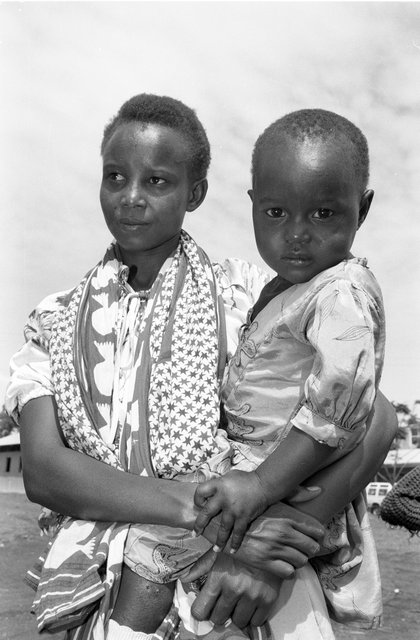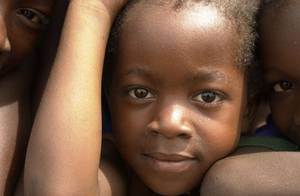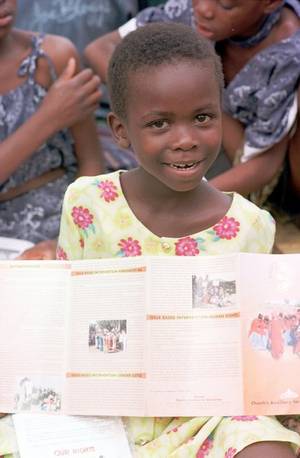Maryann's Reflection
Fantasies about rape. In this film the woman leading the discussion says that men have “too many fantasies about rape.” I think her words are accurate and poignant. They show how men have these ideas of what rape is. Rape, however, is not about sex. It’s not about a woman provoking a man to the point where he cannot contain himself, literally. It’s about power. That is why it’s a tool of war. It’s the power to take something from someone that should never be taken. It’s the power to destroy families and villages and whole countries. It is about the control; it’s not about the sex.
Excuses. During the discussion with the officers and soldiers they repeatedly pointed out that the women were “contributing” to their rape. It’s as if men cannot control themselves. They see a woman and then they cannot stop. That is not true. We are, each of us, responsible for our actions. The rape is never asked for. She never demands it. The men are seeing the woman’s dress as a way of excusing their actions. However, once we know that rape is not about sex, but instead about power, we see how the idea of provocative dress or being in a “bad” area late at night is only a veneer of an excuse.
More excuses. The one officer also expressed the belief that rape was a new phenomena in the Congo. There was no rape before the war. The foreigners brought in this crime. The men of the Congo would never do such a thing, unless they learned it from outsiders. This type of thinking leads to power inequalities between nations, it also dismisses the responsibility of the people of the Congo. If rape is not their problem then we don’t need to address it – in fact the man says so at the end. If we just wait, it will go away. Let’s blame someone else and just wait. A very fancy way of burying your head in the sand.
However, the men were not the only ones making excuses. The woman leading the discussion was also making excuses for the men. She expressed the belief that if the laws were enforced the men would stop raping. If only they thought they would be punished they would stop. While this may deter some of the rapes, this does not address the root cause. This is another excuse.
The cause of rape is the power inequality between men and women. We need to enforce laws, but we need to empower women and men to become equals. Not to be the same, but to be equally respected and equally valued for their unique contributions. We need to be seen as we were seen by God, when God created us. “God said, ‘Let us make man in our own image, in the likeness of ourselves, and let them be masters of the fish of the sea, the birds in heaven, the cattle and all the wild animals and all the creatures that creep along the ground.’ God created man in the image of himself, in the image of God he crated him, male and female he created them.” (Gen 1:26-27 New Jerusalem).
About the Author
Maryann Philbrook: She is originally from Louisiana in the United States, but currently lives in Austin, TX. She worked for the World Student Christian Federation in Geneva, Switzerland as the Communications Intern in 2009. Maryann started blogging in 2003, but has really picked up the pace since she started working for WSCF in 2009, with her blog about her experiences in Geneva. Maryann graduated in 2006 from Occidental College in Los Angeles, where she received a bachelor’s degree in Politics. After graduating from University she was a Beatitudes Society Fellow, an Episcopal Urban Intern and an English Language Assistant in France. Aside from being passionate about the French language, Maryann’s heart goes out to reconciliation among different strands of Christianity so that a more just world can be created.
Lucy's Reflection
I don’t know his name – the army officer in Fighting the Silence – but his is the face which will stay with me from this film.
In some ways, it’s a relief. There is no political correctness in this clip. The man seems to believe genuinely that rape is an imported problem and that given time, it will die out. He even commends the woman worker – ‘Keep it up – we’ll get there.’ It could almost be funny if it weren’t so painful.
In 15th century Europe, when syphilis first took serious hold within the population, France and Italy were at war. The French named syphilis ‘the Italian disease’ and the Italians called it ‘the French disease’. There’s nothing new about blaming bad things on outsiders.
And there’s nothing new about blaming the victims either and this film shows all the old myths – ‘Look at how they dress’; ‘Out at midnight – she asked for it!’. The twisted logic is trotted out shamelessly. ‘If you put your finger up a woman’s nose these days, it’s rape’ is the bizarre complaint of one man. ‘They rape us’ says another. These men truly terrified me – wilful ignorance, defensiveness, denial. Squirming in their chairs, they personify the attitudes which have to be challenged.
The sheer scale of rape in the DRC is terrifying. Multiply that by the toll of suffering in Darfur, former Yugoslavia, Iraq, etc. etc….. the pain of the women, but also of their children and families. Each rape has multiple victims. This sheer scale of pain and humiliation doesn’t bear thinking about.
And yet, if we close our minds to the problem, it won’t go away. If it was my mother, or me, or my daughter, or sister or friend, I would want people to share my rage and shame. I would want people to join me in the struggle to make sense of cruelty on this scale, to find healing, to work for justice, to shout ‘ENOUGH!’. If we believe the gospel, the women and men in this film are my sisters and brothers. Turning a blind eye isn’t an option.
I don’t want to think about rape. As a woman and the mother of a daughter, it terrifies me – it is so humiliating, and invasive and inhuman. It’s not about sex, it’s about power – the deliberate, desperate abuse of another’s body.
Of all the films in this study, this is the one which disturbs me most. Perhaps it is because the ugliness of the story contrasts so harshly with the beauty of the cinematography. Please watch the whole film if you get a chance and please keep an eye out for the work of Ilse and Femke van Velzen, the young Dutch filmmakers. But please, above all, pray for the people in the film – the women and the men and the millions like them round the world. I don’t know the name of the remarkable woman community worker either – the one brave enough to stand up to all those men, to listen to their twisted thinking and challenge them directly. I don’t know her name but thanks to this film, her face is in my heart these days and she will be in my prayers for a long time to come.
About the Author
Lucy D’Aeth: She is an English born New Zealander who has been living in Switzerland for two years. Most of her time at present is taken up being mother to three young children (11,9 and 5), but in previous lives she has studied history and theology and has worked for churches and in Public Health. She is active in her local Lutheran Church and is daily challenged and enriched by living in such a multicultural community.
Fulata's Reflection
I watched the video on DRC sexual violence against women once again after a five hour-meeting on women’s sexual and reproductive health here at Union Theological Seminary in New York. I listened to the women share their stories of pain, and I listened to the men shift the blame either to the foreign soldiers from neighbouring countries or women and girls for their inappropriate clothing.
Listening to the women talk about their painful dehumanization with courage and zest for life, I cannot help but wonder why God was silent when these women went through what they went through? Did it not bother God that these women’s bodies were being broken and their dignity dismembered? Recently I have agonized a lot about such moments when God seems so silent. I am still painfully and searchingly reflecting on this seemingly divine ‘inability’. Once in a while I come across some holes of insight. Insights I am still making sense of. Could it be that the mystery that I have to live with is the fact that it is only God who knows and understands why silence is the most righteous response at such moments?
Listening to the husband, the soldier, the police and the other men explaining away their responsibilities in all this, I cannot help my ancestors’ blood boiling with anger within my vessels…how long will such kind of men hide in such excuses and still get away with it? How can the husband think that sending his wife away to defend his honour bring healing to his broken wife? Why is his honour more important than the welfare of his wife? What would his wife have done if the tables were turned: he was raped and she was not? I know that most of women would stick with their partners if this happened to their partners. To most women, the choice would not be between ‘defending’ their honour or journeying together with their dehumanized partners. Probably the choices would have been rather: how far should she journey with her partner for his healing; and how much can she help restore his dignity? It is very unlikely that her conversation would venture into how short or thin his pair of trousers was that mandated his rape.
I listened to the woman facilitating the conversation with men. I could feel her frustration at some of the stereotypical attitudes and reasoning by men. As she bravely worked on how to best respond to such biases without bringing the conversation to an abortive end, I saw rays of hope. The hope that awareness raising was going to bring…the hope for change. Men and positive masculinity as part of the solution to sexual violence! Together in partnership, we can make even DRC a safe and peaceful place for women and children.
About the Author
Dr Fulata Mbano-Moyo is a systematic theologian and church historian who currently works as the World Council of Churches' Programme Executive for women in church and society. Originally from reformed tradition in Malawi, she received her doctorate from the University of KwaZulu- Natal, South Africa, focusing on gender and sexual ethics with grounding from Yale University's Divinity School and Department of Public Health. She is also the continental coordinator of the Circle of Concerned African Women Theologians also trained in contextual Bible study methodology, conflict resolution and epidemiology.






